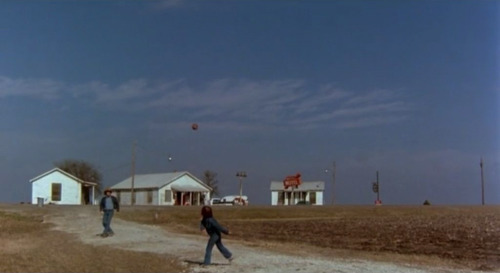“Sing It the Way You Feel It”: Forgiveness and Faith in ‘Tender Mercies’ by Daniel Carlson
By Yasmina Tawil
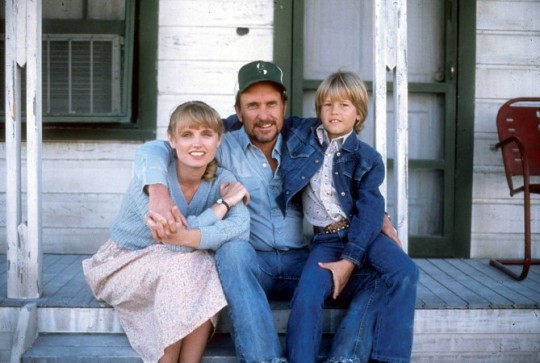
“Now faith is the assurance of things hoped for, the evidence of things not seen.”
— Epistle to the Hebrews
///
Tender Mercies looks like nothing on paper. The script by Horton Foote is spare and direct, and the dialogue seems to sit damply on the page: “How long have I been here?” “Two days.” “How far is it to the nearest town?” “Four miles.” Conversations are short, stripped of any color or imagery, and scenes are brief and focused. The film itself, released in March 1983, initially comes across that way, too. Director Bruce Beresford steadfastly refuses to do anything showy, turning the Texas desert of the story’s setting into an empty, desolate place devoid of anything attractive. Playing out in elliptical bursts, the film starts quietly and stays that way throughout, ambling through its story of a washed-up country singer, Mac Sledge (Robert Duvall), who finds himself broke and hungover at a tiny motel run by Rosa Lee (Tess Harper) and begins working at the property to pay off his debt before sticking around and becoming a part of her life.
Any given scene in the film doesn’t look like much, and it probably wouldn’t feel like much viewed out of context. Yet there’s a fragile beauty in the way the film adds up to be so much more than the sum of its dusty parts, and the work as a whole is a powerful, earnest, lovely film about redemption, forgiveness, and—in a manner more honest than almost any other American film of the modern era—faith. Tender Mercies belongs to that rare class of film that directly addresses religious faith not as a talking point or as a weapon to be used on the audience, but as a genuine component of the lives of its characters, without attempting to ignite that faith in the viewer or resorting to the extremes of piety or bitterness to make its spiritual point. It is, in every manner and method, honest, and its examinations of the small acts that define love and compassion are among the most insightful ever put to film.
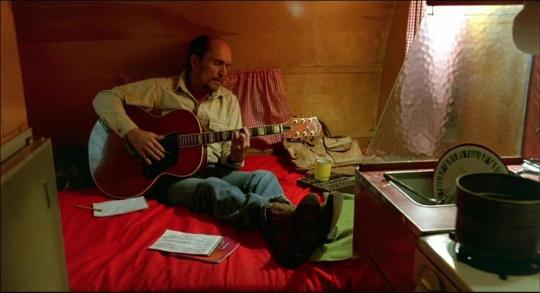
It’s not surprising, though, that it looks so ordinary. Film can be an amazing medium for so many things, but it’s often terrible at exploring the micrometers of nuance that make up a change of heart. It’s a medium of action, and belief is invisible. A film can communicate the aftermath of conversion, or convey relationships through conversations and acts, but the silent work of contemplation and kindling is harder to show. One of the reasons so many “faith-based” films feel so cheap and thin is that they ignore this—or worse, think that talking about belief is the same as showing it. They wind up delivering hollow homilies. They’re also designed to do the very thing Tender Mercies never once attempts: proselytize.
If a modern Christian film wants to convert its viewer, Tender Mercies merely wants to tell the story of a man who converted; they want you to find faith, while Tender Mercies wants to illustrate what that found faith looks like in the life of its particular characters. The grand irony of all this is that high-octane proselytization backfires incredibly easily. People smell goals a mile off. Tender Mercies wants to move the viewer the way all good films do, stirring in them an emotional response to the story unfolding before them. As a result, it does more to demonstrate the virtues of things like faith and forgiveness than any more ostensibly goal-driven film ever could.
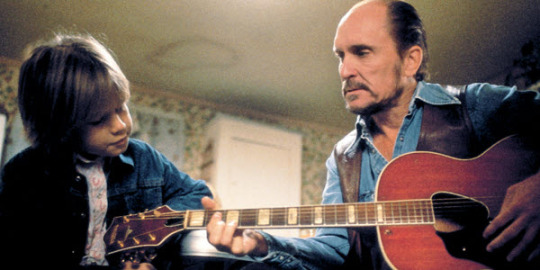
The changes that take place in Mac’s life are all presented as small ones, their grand effect only felt at the end. He works for Rosa Lee for a few days to cover the cost of his room, picking up trash and doing other odd jobs, before asking if he can stay and work on a permanent basis. Beresford moves through these scenes quickly, yet without any sense of hurriedness or urgency; the effect is of listening to someone recount their life story, skipping easily between moments to cover what matters. Rosa Lee has a young son, Sonny (Allan Hubbard), from her brief marriage years earlier to a young man who would die in Vietnam, and we see Mac start to join them for dinner, watch TV with them in the evening, play guitar in his room. The initial dinner scene can’t be more than a minute long, but we get everything we need from Sonny’s blunt way of asking Mac his name, Rosa Lee’s pensive pause to see how things will play out, and Mac’s smile as he kindly answers. There’s a kind of emotional pragmatism to the drama, and it’s no real surprise when Mac one day quietly asks Rosa Lee to marry him. The wedding happens off screen, too; that is how little this film cares about being conventionally satisfying.
The film goes unscored, as well: although a score was composed, Beresford removed it to avoid anything sounding too sweet or pat. The only music in the film comes from the songs performed by Duvall and others, and these are almost always happening within the scene (e.g., Mac playing guitar and singing while sitting on his bed). Only a handful of times does a song play over the action to underscore the emotions of the scene. Instead, natural sound compensates for a score: wind over the desert, the creak of screen doors, the way truck tires crush gravel, old chairs squeaking as they’re pulled up to tables. The film’s focus is so resolutely, expertly keyed to minor human moments that it edges into the territory of documentary.
Similarly, Mac’s introduction to Rosa Lee’s faith is downplayed. One morning, we see them driving to church in Mac’s truck, Sonny sitting between them, and then we see Rosa Lee singing in the choir of the tiny church as Mac and Sonny sing along with the rest of the congregation in the pews. Then we see them leaving and chatting with the pastor, who does a bit of glad-handing with Mac in a way that will be instantly familiar to anyone who’s ever been south of the Red River. And that’s it. Like that, we’re off to the next scene. It’s easy to imagine how this might’ve been handled by a different writer or director, or with a different goal in mind altogether: Mac fidgeting in the pew before realizing that maybe everything is OK, Mac making eyes at Rosa Lee, a particularly pointed metaphor in the pastor’s sermon. Such gimmicks, though, would betray the filmmakers’ lack of trust in the viewer to understand what was happening, and they’d also tip the filmmakers’ hand and reveal that the goal is not to tell a story about a guy named Mac Sledge, but to use that story to call the viewer to action.
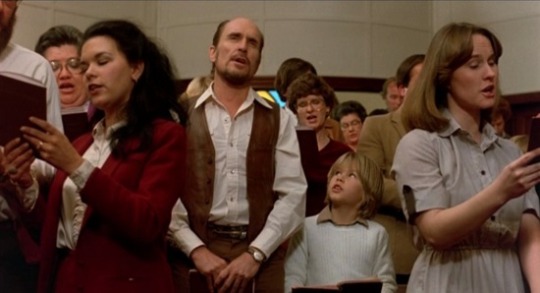
In fact, nothing about the way the film plays it is expected. Mac’s ex-wife is a popular country singer named Dixie (Betty Buckley), who made it big singing songs Mac wrote for her and who jealously guards their daughter, the now-adult Sue Anne (Ellen Barkin), from seeing Mac. While Mac’s dealing with that, he also gets approached by a local band of young guys who heard the great Mac Sledge was staying in their area and who want to persuade him to come sing a number at their next roadhouse gig. The Hollywood version of this is so obvious it’s probably already occurred to you: Mac and Dixie find a way to bury the hatchet, Mac and Sue Anne start to rebuild their relationship after so many years lost, Mac rediscovers his passion for music while singing, Mac and the band start to become popular regionally and then beyond that, etc., etc.
This wouldn’t necessarily be terrible, either; 2009’s Crazy Heart starred Jeff Bridges as a washed-up country singer and was basically that kind of movie, and Bridges earned an Oscar for his trouble. Yet Tender Mercies always opts for smaller, more ambiguous resolutions to its problems. No one ever gets that far ahead of where they currently are. Everything takes work. When Mac starts singing again with the local band, he gets smiles of recognition from the people in the audience, but he doesn’t find his career revitalized. When a reporter (Paul Gleason) tracks down Mac at the motel, Mac turns down the interview, and the small story that comes out doesn’t do much to revive flagging interest in the aging singer. When Mac finally gets a chance to see Sue Anne again, he’s so overcome with emotion that can’t bring himself to even say her name, and when she asks him if he remember the old gospel song he used to sing as he rocked her to sleep, he demurs and says he doesn’t recall. It’s only as he watches her drive away that he looks out the window and gently sings “On the Wings of a Dove.” No one around to hear him, no telling what’s happening inside him.
This is the nature of faith explored by Tender Mercies: not major moments, but the accumulation of a thousand smaller ones. Even Mac’s baptism, what would be a milestone moment in a modern faith-based movie, is done with little fanfare or drama. In the film’s second and final scene at the church, the choir finishes singing as the curtains are drawn back in the tiny baptistery, and we see the pastor baptize Sonny and Mac. Rosa Lee’s happiness is evident—she shares a smile with a fellow choir member—but there’s no sense that the film has built to this moment, or that things are now different, or that Mac has won some kind of victory. Life has to keep going on. Sonny asks Mac on the drive home if he feels any different, and Mac grins and says he doesn’t, but maybe it’ll happen later. It’s vital that Mac’s particular religious decision is not presented here as a panacea. Yet neither is it mocked or treated as the escape sought by someone unable to cope with the real world.
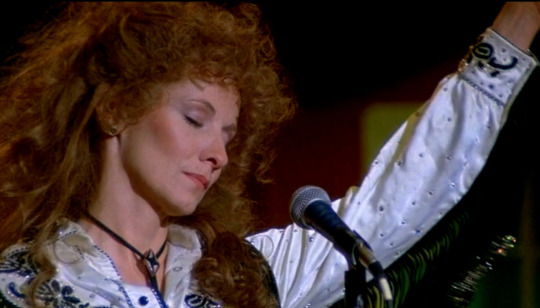
When tragedy visits Mac’s family later in the film, he doesn’t reject his newfound faith, nor does he use it to sublimate his feelings of grief or confusion. He wrestles with his sadness like a man at odds with the universe—that is, like an adult—and Beresford and his actors trust us enough to let us dwell in the tension with Mac.
(Plot spoiler ahead.)
Mac gets word one day that Sue Anne, who’d eloped with one of the members of Dixie’s band, was killed in a car wreck in Louisiana. Mac’s search for meaning yields no answers, and he pours himself out in the longest speech in the film. It’s also one of the film’s most beautiful moments, Duvall and Harper talking in the garden as Beresford slowly moves the camera in a wide shot that captures them against the Texas plains. Mac grieves:
“I was almost killed once in a car accident. I was drunk, I ran off the side of the road, and I turned over four times. They took me out of that car for dead, but I lived. I prayed last night to know why I lived and she died, but I got no answer to my prayers. I still don’t know why she died and I lived. I don’t know the answer to nothin’, not a blessed thing. I don’t know I wandered out to this part of Texas drunk, and you took me in and you pitied me and helped me to straighten out. Married me. Why? Why did that happen? Is there a reason that happened? And Sonny’s daddy died in the war, and my daughter killed in an automobile accident. Why? See, I don’t trust happiness. I never did, I never will.”
Tender Mercies denies its characters clean getaways, emphasizing that faith, hope, love—life, really—is always about the road you have to walk. But Protestant Christianity is the third rail of American filmmaking, and that kind of nuanced, uncomfortable conclusion, wherein people learn that maybe not everything will be OK and they don’t have a choice about it except to keep going forward anyway, makes for a hard sell. Interestingly, of the handful of movies that have attempted that kind of adult understanding of the give and take of faith and doubt, one of the best features an older Robert Duvall: 1997’s The Apostle.
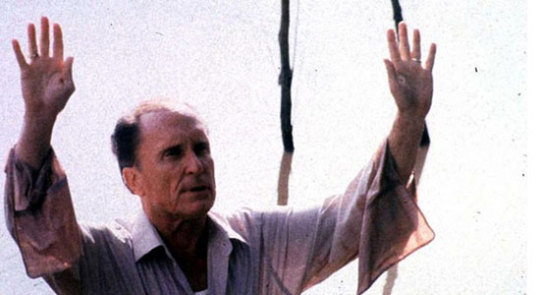
The Apostle was a passion project for Duvall, who wrote the script in the 1980s but couldn’t find a backer. He eventually paid for it himself and directed it. He stars as a fire-and-brimstone Pentecostal preacher in Texas who’s cuckolded by his wife and then lethally beats the man she’s sleeping with. He goes on the lam to Louisiana and rechristens himself “The Apostle E.F.” as he works to start a new church. The character’s real name, though, harks back to Tender Mercies: Sonny. In addition to the metatextual echoes of the name and locations, it’s easy to see Duvall’s Apostle as a counterpoint to Mac Sledge, or maybe the paired bookend for a life’s volumes of experiences. Mac got sober as he dedicated his life to Rosa Lee, and never strayed; the Apostle is fond of liquor and women both, viewing those temptations as thorns in his side whose wounds only God can salve. Yet the Apostle is a man of genuine faith, and though Duvall’s film is electric where Beresford’s is soothing, they’re both experts at exploring how their characters react to trauma and reckon with the hand they’ve been dealt. Mac’s existential crises were quiet, but the Apostle’s are loud. He brays in church and shouts his prayers at home, stalking back and forth as he addresses his ceiling and begs God to give him any kind of sign or direction. Again, Duvall isn’t mocking his character for doing this, nor does he make his character blameless and sure to overcome all obstacles. Rather, his character uses faith as a way to understand the world.
The Apostle also comes closer than any film to capturing the raw confusion of spiritual and emotional transformation. One evening, the Apostle’s church is visited by an angry racist, played by Billy Bob Thornton. He upsets things so that the Apostle takes him outside and actually beats him up. The man returns days later to a church picnic, driving a bulldozer, intent on demolishing the building. This time, the Apostle places his Bible on the ground in front of the machine. And from there, he manages to talk to the man and draw out his anger and pain:
“I’m embarrassed by it,” the man whispers. “I was a worse sinner than you were in my time,” the Apostle whispers back. And then the man begins to weep. No triumphant music, no sense of victory won or life changed, no montage of the man working in the church’s food pantry, no title card about the changes that rippled out from that one instant. Just a man feeling embarrassed and afraid of change, and someone offering him some comfort.
///
When the local band in Tender Mercies first comes to pay tribute to Mac Sledge, they ask him if he has any advice for them. “No, I don’t really,” he replies. “Just sing it the way you feel it.” It sounds so simple, but it’s the hardest thing to do. It requires having a feeling, then being self-aware enough to identify it, and then— hardest of all—brave enough to put that feeling honestly into the work. That’s what ultimately undoes so many movies that try to talk about faith. They lack a sense of honesty about life’s complexities, the myriad problems and glories that face us, that their attempts at storytelling ring hollow. What The Apostle and especially Tender Mercies so eloquently capture is the nature of faith itself: taking a single step. Then, later, you take another.
